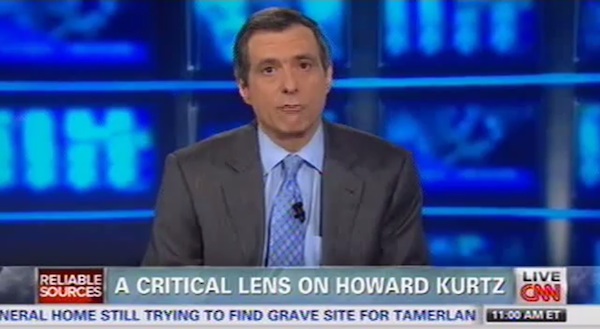

Kurtz’s rare accountability: Media critic Howard Kurtz’s status was pretty well settled by the end of last week after his disastrously erroneous column earlier in the week — he was fired by The Daily Beast, but still in good standing as host of CNN’s Reliable Sources. Kurtz allowed himself to face a 2-on-1 grilling by NPR’s David Folkenflik and Politico’s Dylan Byers, summarized well at Mediaite.
Hardly anyone watched it, but a number of media observers found the Kurtz’s apology (he called his work “sloppy and inexcusable”) and interview significant — Poynter’s Andrew Beaujon offered a good rundown of some of their opinions. Several of them still had lingering questions after the episode: Sharon Waxman of The Wrap was unimpressed with what she saw as a thin response to questions, writing, “Merely repeating an apology and stressing one’s sincerity is not a ticket back to play on the journalism field.” Variety’s Brian Lowry found it jarring to see Kurtz immediately return to his perch as the media’s ethical cop, and The Washington Post’s Erik Wemple criticized him for refusing to apologize when his error was first found out.
The interview also addressed another aspect of Kurtz’s story — his role at the Daily Download, a little-known website which he mentioned and appeared on often. Before and after his firing, Daily Beast staffers voiced concerns that he was devoting too much energy to the site. The Huffington Post’s Michael Calderone said Kurtz downplayed his role at the site in the interview, in which he said he’s only a contributor. The Washington Post’s Wemple examined Daily Download founder Lauren Ashburn’s increasingly ubiquitous role on CNN, and both Calderone and Northeastern professor Dan Kennedy questioned the Knight Foundation’s decision to award the site a grant in 2011.
Other saw something noble in Kurtz’s show on Sunday. Several commented on just how remarkable and rare it was to see a critic and pundit willingly subject himself to such scrutiny: CUNY’s Jeff Jarvis hoped it would become an example for journalists who make high-profile mistakes, and Eric Deggans of the Tampa Bay Times suggested that “as social media and the online world have made our errors more visible than ever, such directness just might make the difference in gaining and maintaining the public’s trust for the future.”
Salon’s Alex Pareene also marveled at the rarity of Kurtz’s questioning, but also contended that the extent of the consequences Kurtz will ultimately face is mere embarrassment, thanks to his elite status. Still, Time’s James Poniewozik saw the fact that Kurtz faced any sort of consequences as surprising, as he wished for other pundits to be held to similar public scrutiny when they get things wrong.
![]() Politico tries a paywall: Politico, one of the most influential non-legacy news orgs in the U.S., joined the paywall brigade this week with its announcement that it would test a metered pay plan for its site. Politico will test the plan out on readers in six states (sorry about that, Iowa, Mississippi, New Mexico, North Dakota, Vermont, and Wyoming) and outside the U.S., experimenting with various prices and meter limits.
Politico tries a paywall: Politico, one of the most influential non-legacy news orgs in the U.S., joined the paywall brigade this week with its announcement that it would test a metered pay plan for its site. Politico will test the plan out on readers in six states (sorry about that, Iowa, Mississippi, New Mexico, North Dakota, Vermont, and Wyoming) and outside the U.S., experimenting with various prices and meter limits.
The announcement emphasized that Politico’s leaders aren’t sold on the paywall model, but want to try it out because they believe their audiences are more likely to pay than they had previously thought. They also said it’s “highly unlikely” they’d try out a paywall in Washington, D.C., where their advertising-and-traffic-based model is working well. As The Washington Post’s Erik Wemple noted, Politico also ventured into sponsored content on its homepage for the first time this week.
Elsewhere in paywalls, the Lab’s Justin Ellis reported on tweaks The Dallas Morning News is exploring its (currently relatively hard) paywall — possibly a metered model, or time-limited access. He also gave some details of how The Boston Globe used its free/paid two-site strategy to cover last month’s Boston Marathon bombing. And blogger Andrew Sullivan provided another update on his pioneering pay model, reporting that he’s expecting to fall short of his $900,000 annual goal and is brainstorming about new sources of income to add.

Big guns line up against Kochs: The campaign to keep the conservative billionaire Koch brothers from buying the Los Angeles Times, Chicago Tribune, and other Tribune Co. newspapers has been building over the last couple of weeks, and it came to a head this week. As The New York Times reported, 10 public employee unions sent a letter to the company’s largest shareholder, Oaktree Capital Management, threatening to press to withdraw Oaktree’s pension fund assets if the deal went through. The two top leaders of California’s legislature also objected to the sale.
The Guardian reported that more than 250,000 people have signed a petition, organized by the Courage Campaign and the liberal blog Daily Kos, to urge Oaktree not to sell to the Kochs. Public sentiment hasn’t been voiced nearly as strongly in Chicago, where only a couple dozen people turned out to protest Thursday in front of the Tribune’s offices, as Crain’s Chicago Business observed.
A number of conservatives, of course, saw the outrage over the Kochs’ potential ownership as myopic concern over a newspaper that hasn’t played it straight for quite some time: Syndicated columnist Cal Thomas and the Washington Times’ Dorian Davis questioned what exactly constitutes objective coverage for those objecting to the Kochs. Zócalo’s Joe Mathews said that while he doesn’t support the Kochs, he thinks their ownership of the Times could be positive for the city, as it either provides a check against the city’s establishment or implodes and prompts L.A.’s most ambitious journalists to create better alternatives.
Reading roundup: A few other stories going on during this slow week in media:
— News Corp. posted good results in its quarterly figures this week, though Capital New York’s Joe Pompeo said the numbers also emphasized why News Corp. is headed for a corporate split (helpfully diagrammed by Quartz’s David Yanofsky) later this year. Meanwhile, its New York Post is attempting to reduce 10 percent of its staff through buyouts, and News Corp. shareholders continued to call for Rupert Murdoch to resign.
— The Royal Charter that had been proposed to set up a stronger regulatory body for the U.K. press has been tabled while politicians talk to newspaper editors about their alternative proposals for the plan. The plans saw a breakthrough a few days later when the papers agreed to drop their right to veto appointments to the new commission.
— Gittip’s Chad Whitacre made some waves this week by requiring that journalists’ interviews with him be live-streamed and posted on YouTube. He blogged about the experience and the nature of collaborative journalism, and paidContent’s Mathew Ingram wondered why more journalists don’t open up the interview process to the public. Meanwhile, Poynter’s Roy Peter Clark delineated the difference between journalistic transparency and translucence.
— A few great data journalism resources: PBS MediaShift offers useful summaries from two data journalism events, one from Italy and the other from West Virginia. And University of Nebraska professor and PolitiFact vet Matt Waite wrote a thoughtful post at Source on turning stories into data, not just data into stories.
— An anonymous newspaper ad exec explained to Digiday just how much trouble the industry is in, and TVNewsCheck’s Randy Bennett offered newspapers’ woes as a caution for local TV.
— Finally, Texas journalism professor Robert Jensen issued a thought-provoking call for a prophetic, apocalyptic journalism to fit our apocalyptic times.
Photo of Koch Brothers kennel from 2011 Occupy Wall Street protest by Caroline Schiff Photography used under a Creative Commons license.